Musical Freestyle Dogs at Sweetbay
Musical
Freestyle
Where and when musical
freestyle got its start is hotly debated, with many folks
from several nations taking credit for the invention. But
whoever thought up this new sport did the dog-owning
world a huge favor. This is truly a delightful activity.
In musical freestyle, the dog and handler perform
together to music of the handler’s choosing.
Defining it further is impossible, because there is
unlimited variety! One handler may use mostly heeling
moves and perform to jazz; another may create his own
clever tricks and work to rap or the current pop
40’s hit. But one thing is consistent: dogs and
owners love this sport with a passion.
One definition is “heeling to music,” but this
is like calling a Lamborghini simply a car. Good
freestyle routines find the dog working at different
distances from the handler, moving in and (mostly) out of
heel position, doing twists, spins, weaves and reverses
that would incur zeroes in the obedience ring. But in
freestyle, such moves are rewarded with high scores and
hearty applause. In fact, pretty much anything goes, and
clever handlers with an ear for music and an eye for
choreography can present astounding routines. Sit
ringside and watch a freestyle competition, and you may
find yourself thinking of skater pairs doing an ice dance
routine. Indeed, freestyle entrants are scored similarly,
with points being awarded both for technical merit and
for artistry. Some freestyle performers restrict
themselves to several basic moves, while others take a
routine into flights of fancy. It’s perhaps the most
striking difference from obedience: in this sport,
originality is rewarded and creativity is much desired.
As you might imagine, freestyle is a sport that appeals
to spectators, and the competitors go all out to attract
the crowd’s admiration and applause. Costumes are
chosen to complement the music; dogs are encouraged to be
flashy and exuberant and show off their natural
athleticism. The music may be classical or techno-pop,
waltz tempo or tango, melodic or raucous. The handler
begins by building on body postures and movements the dog
does naturally, and many dogs who are bored with
obedience find freestyle the perfect answer . The sky
truly is the limit in freestyle, and that’s one
reason it’s so popular with experienced dog trainers
and novices alike.
There are many agencies that sponsor freestyle
competitions across the country. Each offers competitions
with slightly different rules and slightly different
classes. In general, a handler may compete as an
individual (one handler with one dog), in brace (one
handler working two dogs simultaneously, or two handlers
working two dogs, depending on the venue) or in team
(three or more handlers, each working a dog). The
routines are judged and scored, and qualifying legs are
earned if the performance merits. Acquire the requisite
number of legs, and you’ve got yourself a freestyle
title.
A freestyle routine starts with music selection. The
handler chooses an appropriate song he loves –
appropriate in that it must fit his dog’s natural
gait, and be a song the handler is willing to hear over
and over, hundreds of times, while practicing with his
dog.
Next, the song is separated into portions and each
portion gets its own moves. Working out this choreography
takes considerable time, as the owner begins with actions
the dog does naturally and expands on them, as well as
teaching him new moves. In addition, the steps need to
fit the music. A slow piece needs graceful elegant moves;
an uptempo song can incorporate jazzy quick actions.
There is much movement in freestyle, and a good routine
will range over a large (defined) area, much as ice
skaters use the entire rink in a performance.
Then there are the costumes. What the dog and handler
wear should go with the music and appeal to the audience
(and to the judges).
Three elements: music, moves, costumes. Done well, what
results is breathtaking and mood-elevating. And not just
for the audience!
Bonnie Fergusson began teaching her Newfoundland, Kyak,
freestyle moves at the same time they were working on
advanced obedience. Kyak immediately showed promise as an
outstanding freestyle dog – not that anyone who knew
him was surprised. A natural clown, Kyak loves to learn.
Even from puppyhood, the more moves and tricks Bonnie
taught him, the happier he was. Freestyle was made for
this dog, and he and Bonnie soon dove into the sport
wholeheartedly.
The routine you see pictured on this site is performed to
Aaron Tippitt’s rocking country song, “Kiss
This.”
World Canine Freestyle Organization, Inc
Freestyle Dog (W-FD):
CanCh Sweetbay’s Kyak CD CanCDX WRD CanWRDX DD
CanDDX W-FD FDN, OFA NF-7189 (Bonnie Fergusson)
Paws 2 Dance Inc
Freestyle Novice Dog (FDN):
CanCh Sweetbay’s Kyak CD CanCDX WRD CanWRDX DD
CanDDX W-FD FDN, OFA NF-7189 (Bonnie Fergusson)
In
case you are wondering what the titles are before and
after the dogs’ names, click here.
For more information about the
Adlers’ dogs:
Sweetbay Newfoundlands
Judi & Ellis Adler
12320 SW Malloy
Sherwood OR 97140
(503) 682-0604
e-mail: sweetbay@teleport.com
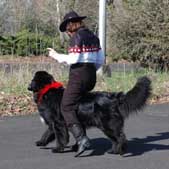
The routine begins when Bonnie “saddles up” and rides Kyak. Their footsteps are right in time with the music.
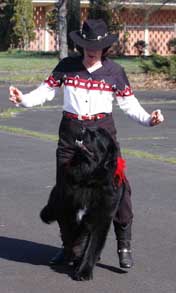
Then they reverse, moving backwards to the beat.
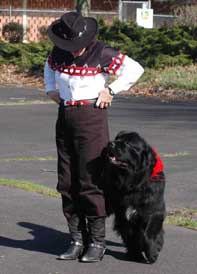
Kyak loops around Bonnie in tight quick circles.
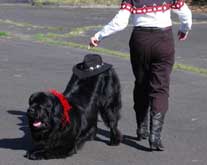
In a crowd-pleasing move, Kyak freezes in a deep bow. Bonnie walks around him, dropping her Stetson onto his rump.
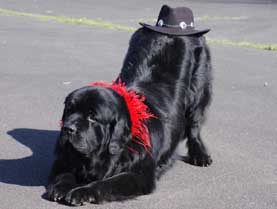
Kyak holds the pose for several beats as Bonnie circles behind.
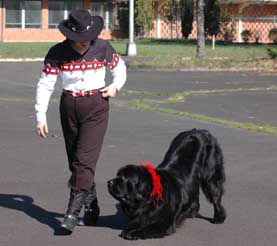
She retrieves her hat, then tells Kyak it’s time to mosey on.
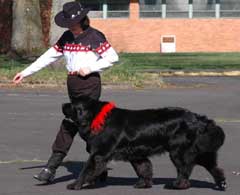
They heel forward a short distance, again matching their footsteps with the beat.
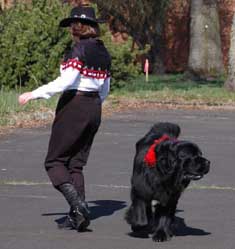
They break apart while heeling: Kyak spins in one direction while Bonnie spins in the other.
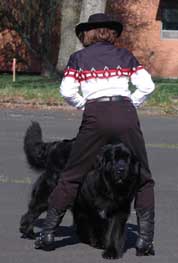
Weaving through the handler’s legs is a standard freestyle move, but it’s awesome when done smoothly by a dog the size of a Newfoundland.
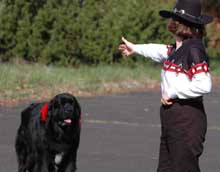
As the song nears its end, Bonnie assumes the stance, raises her arm, and fires a gun (actually, her fingers) at Kyak.
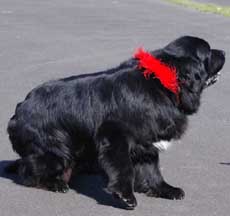
Kyak slowly spins in a circle, staggering, and finally – having milked his death throes just like a five year old kid – he crumples to the ground.
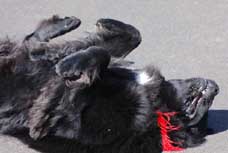
He freezes upside down, rolling his eyes, acting very much like a dead dog. Until the applause bursts forth. Then he’s up in a heartbeat, accepting the accolades he knows are for him.